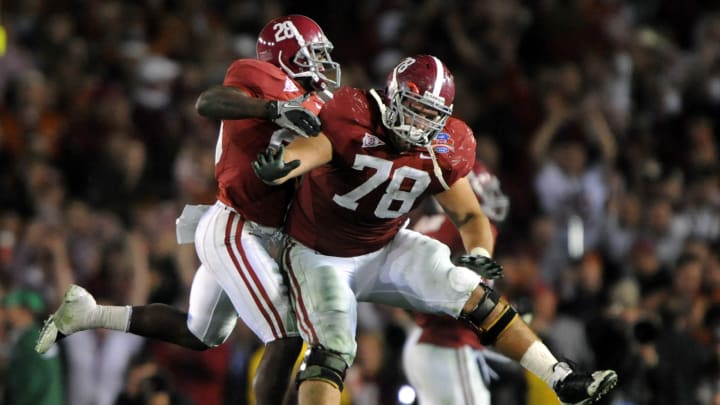A Decade of Changes: Former RT Mike Johnson on Alabama's Coaching Shifts

In the annals of college football, few coaches have left a mark as indelible as Nick Saban.
During Mike Shula's tenure coaching Alabama from 2003 to 2006, the program grappled with substantial challenges on and off the field. The team encountered difficulties in maintaining consistent success, and a pervasive sense of instability affected morale throughout the ranks. Recruiting efforts, while decent, lacked the strategic depth and national allure seen in top-tier programs. Auburn had notably surpassed Alabama during this period.
Everything changed with Saban's arrival in 2007. His tenure marked a turning point for the Crimson Tide, characterized by a relentless pursuit of excellence and a meticulous approach to building a championship-caliber team. Saban brought a disciplined regime that demanded accountability from instilling a culture of hard work and commitment to the process.
For former Alabama offensive tackle Mike Johnson, who played for the Crimson Tide from 2006 to 2009, reflecting on Saban's arrival in 2007 brings to mind significant cultural shifts within the program — a parallel he sees in the current situation under Kalen DeBoer.
Johnson, a standout who earned first-team All-American honors from Pro Football Weekly in 2008 and was later named a consensus first-team All-American, vividly recalls the impact of Saban's structured approach amidst transition from one coach to another.
"When Saban got there, it was like, 'That's not how we do things,'" Johnson recalled, reflecting on the immediate culture shift that followed Saban's arrival. "I noticed that a lot less, a lot of those things were tolerated, I guess is the way to put it. He didn't even have to rely on himself to have those conversations. It went from position coaches to room leaders to the leadership group and on down," Johnson added, highlighting the structured hierarchy Saban implemented to enforce discipline and accountability.
Similarly, under DeBoer, Alabama is navigating another program defining moment in its history. DeBoer's approach seemingly combines Saban's foundational principles with a modern twist, adapting to the complexities of today's college football landscape. His emphasis on player development, leveraging NIL opportunities, and embracing technological advancements brings forth a forward-thinking strategy aimed at sustaining the Crimson Tide's legacy of success — but it's implementation is not without serious challenge.
Reflecting on whether Saban's coaching approach in 2007 would be effective today, Johnson stressed the need for adjustments in the current "wild west" of college football.
"You hold guys' feet to the fire, and they probably exit more quickly when they don't like what's going on," Johnson said, contrasting today's player mobility with the commitment and perseverance expected during his playing days. "We didn't have money in our pockets like some of the guys today, so I think you have to treat the players nowadays more with kid gloves."
Addressing the impact of NIL deals on team dynamics, Johnson expressed concern about the potential disruptions caused by financial incentives.
"I don't think there's any doubt," Johnson said. "You hear stories of players at programs walking in and demanding more money before a big game, when you have agents and other people in your ear that aren't part of your football team, it can lead to listening to them at the wrong times."
Recalling the role of veteran players in integrating new recruits, Johnson spoke on the transition from high school stars to college expectations.
"When I first got on campus at Alabama, the offensive line coach turned his hat backwards to get close enough to my face to yell at me," Johnson said. "Coach Saban put leadership in the players' hands. There was a leadership committee with older guys from each meeting room and key players meeting to ensure everyone was on the same page. And I'm sure that that's one of the things that maybe he's passed on to coach DeBoer in terms of things that might be necessary. So, like I said, I mean, the good thing is, for coach DeBoer he's kind of got a blueprint set out in front of him, of, you know, a good way to do things."
In discussing the keys to maintaining high standards during coaching transitions, Johnson spoke on the importance of continuity and discipline. Drawing from his experiences under Saban, he addressed the need for coaches to uphold a consistent standard of excellence, ensuring that team values are preserved amidst changes in coaching staff or player personnel.
"You have to uphold a standard of excellence," Johnson said. "Once one guy misses a workout or holds out for more NIL money, that's a slippery slope. So you can't allow those things to happen. And I think that having the mentality passed from kind of one age group to the next and on to the next is going to be very important for [DeBoer]. Because, I mean, you've seen it time time again when coaches have taken over for successful programs that maybe they have a good first year, maybe have an okay second year, but eventually, if they don't do things the right way, it tends to fall off after a while. And so hopefully he's able to get that done."
Reflecting on team-building exercises during his time at Alabama, Johnson recalled the intense competition and camaraderie forged through rigorous training.
"Our team building activities were getting our a-- kicked all summer and all winter," Johnson said with a laugh. "It was competing against one another, facing away in one-man tug-of-wars or competing in the L drill to see who could finish first. See who would, you know, be able to finish and go home earlier? Or, you know, just, just things like that, that, you know, we're team building type things that weren't always fun, right? I mean, we weren't always going to get Capri Suns and things from a cooler afterwards. It's just, we were expected to work hard. And I think that's really, in the end, what kind of brought us together, right? I mean, you were expected to work hard. You went out and grinded, and when you had that victory on Saturdays in the fall, you could look around at the guys that were next to you understand what you had all gone through, and that really was the best team building activity you could have."
Johnson believes that as DeBoer assumes his role, his task isn't to overhaul the team's mindset, but to leave his own imprint upon it.
"His charge is not to remake a mentality but to put his own stamp on it," Johnson said. "With the foundation Coach Saban laid and the understanding of today's players, I think he's well-positioned to succeed."
This is the fifth story in a multi-part BamaCentral series looking back at Alabama football’s coaching transition in 2007 as the Crimson Tide prepares for a new head coach in 2024 with Kalen DeBoer.
First story: What It’s Like When Alabama Football Gets a New Head Coach
Second story: Former WR Matt Caddell Looks Back on Alabama’s Last Football Head Coaching Change
Third story: 2007 Alabama Football Provided a Glimpse of Something Special
Fourth story: Nick Saban's Arrival at Alabama Brought Anxiety, Rumors and a Different Mindset
